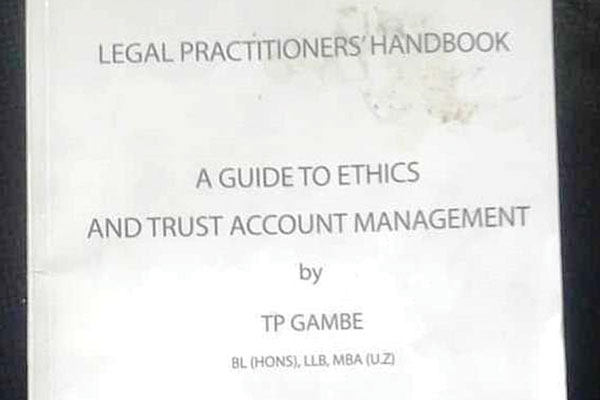
Title: Legal Practitioners’ Handbook Author: Theophilus Pharoah Gambe Publisher: Legal Resources Foundation (2018) ISBN: 978-0-7974-8421-4
Law practice is a professional field held in high esteem, but the reputation does not come cheap.
Between the Lines: Beniah Munengwa

It places a huge demand of ethical and impeccable conduct on its practitioners.
There comes the Legal Practitioner’s Handbook: A guide to Ethics and Trust Account Management by Theophilus Gambe.
Filled with decades of case references, Gambe’s guide to ethics stands as an enrichment to legal practice, both for newcomers and the old horses.
It also extends to empower non-legal persons so that they can understand the processes and relationships between attorneys and judges and be able to know when their lines as individuals have been crossed.
- Chamisa under fire over US$120K donation
- Mavhunga puts DeMbare into Chibuku quarterfinals
- Pension funds bet on Cabora Bassa oilfields
- Councils defy govt fire tender directive
Keep Reading
Issues digested range from the explicitness of the relationship between lawyers in the same firm to cases of negligence and to when one situation is described as sharing office with an unregistered legal practitioner.
As in medicine, no unregistered legal practitioner, notary public or conveyancer can be employed by a firm until registered or re-registered.
Gambe explores the objects and powers of the Law Society of Zimbabwe, extending to the rights of registered legal practitioners.
Going into finer detail of the first section will be tantamount to regurgitating what Gambe has already clearly articulated.
But, as Gambe writes, the “book is primarily a summary of legal ethical principles, practical skills and techniques” in a readable and accessible format suitable for anyone with interests in legal conduct.
Also critical is the emphasis on the point when one gets qualified or disqualified to look over trust accounts, given the vulnerability of funds when they are placed in ill intended hands.
Over the years, many lawyers in Zimbabwe have been hauled before the courts and some jailed for abuse of trust funds.
Gambe’s project lays the foundation to the passage way to having “practice management techniques that build and support the positive fulfilment of the professional rules”.
In Section 1, the book is more of a concretisation of ethics as they are, as provided by law and statutes, but in a digestible manner.
Section 2 moves on to involve more of Gambe’s agency, sharing what emerge from his rich years of experience in legal practice.
Depth characterise this section where the author writes: “Law firms have traditionally not realised the difference the difference between leadership and management.”
A firm without a good and functional leader is bound to fail. Good leadership is shown to be characterised by vision, strategy and a motivation to set up processes that stimulate organisational growth and ability to transform and suit changing times.
As such, there’s a formula for strategic planning. The formula involves establishing the strengths, weaknesses, opportunities and threats present in an organisation.
“The balancing act of being both the provider of legal services to clients as well as being the firm manager may result in one becoming a jack-of-all-trades and a master of none,” according to Gambe.
Hence, the non-owner managed model is preferred in law firm management as being better than the sole practitioner management or the partnership model.
He also underlines the need to rope in software packages for efficiency in the coverage of debt collection, case management, expense tracking and billing procedures.
As the law continues to evolve in the face of inevitable changes in the world on the back of fast moving information technologies, Gambe highlights that there’s a gap that grows: “The legal profession, just like any other profession, requires continuous training.”
The gap can be mitigated by continuous research and exposure to new developments in the field of practice and study.
The most pervading theme hovers around the concept of self-regulation whereby practitioners develop an in-built checker that halts them from venturing into unethical conduct.
But given the state of the African nation, some practitioners will still live up to the dictum that for one to survive the wrath of senior lawyers and that of the world, a number of ethics will be broken.
Yet nothing beats integrity and that is why this book on ethics was produced and as the nation seems tired of ill-practice, ethical behaviour provides for a better alternative to moral development.
Part 3 of the book is a compilation of questions and answers around ethical cases and provides proof of the practicality of Gambe’s ideas.
Edited by John Reid Rowland, The Legal Practitioner’s Handbook project was made successful with the help of the Legal Resources Foundation.
Gambe has vast legal practice experience as a practitioner, leader and examiner. He’s also the author of Ethics: The Legal Profession and Practice Management.
Beniah Munengwa writes in his own capacity. He can be contacted on [email protected]











